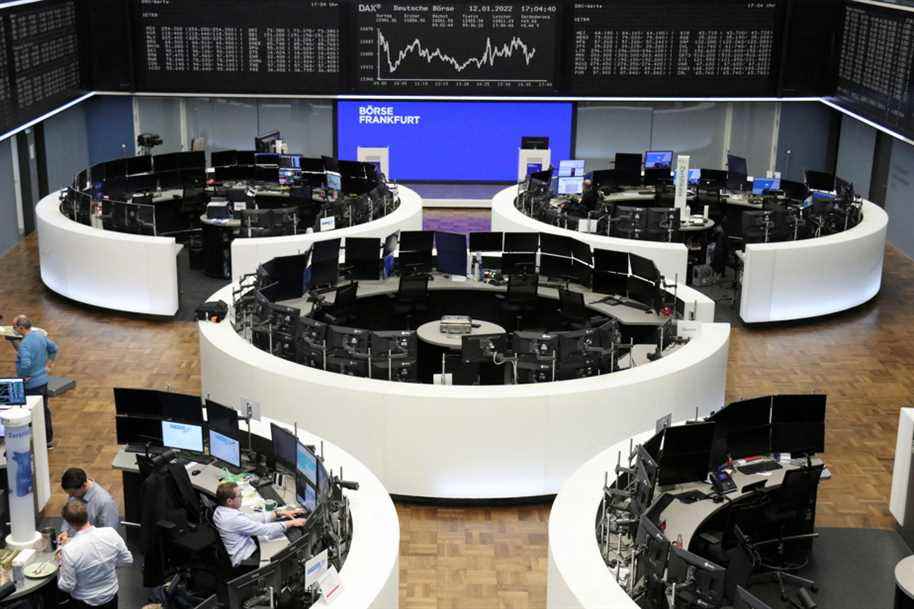(Paris) Markets digested US inflation numbers at their 40-year high on Thursday, while waiting for the fourth quarter corporate earnings season to kick off.
Posted at 7:01 am
After two consecutive rebounds, the European indices paused in Paris (-0.55%), Frankfurt (-0.16%), London (-0.21%) and Milan (+ 0.01%) around 4 a.m. 13.
Asian places ended up mainly down. In Japan, the flagship Nikkei index dropped 0.96% as daily cases of COVID-19 accelerate in the archipelago. The Shanghai Stock Exchange lost 1.2% while Hong Kong gained 0.11%.
Markets kept their cool on Wednesday despite news of inflation at its highest level in nearly 40 years.
“The recent inflation data is a confirmation, and therefore should not have a big influence on trade,” comments Andreas Lipkow, for Comdirect.
In the United States, consumer prices have, as expected, climbed 7% in 2021, registering their largest increase since June 1982.
But in December alone, inflation slowed compared to November, to 0.5% against 0.8% in particular, because the increase in energy prices slowed for the first time since April.
“Yesterday’s reaction in the markets could give rise to hopes that global inflationary pressures will begin to subside,” notes Michael Hewson, analyst at CMC Markets.
“It may seem a bit premature based on just one monthly data, but US industrial producer prices for December afternoon could offer further argument if we see a similar trend,” he notes. he.
In a speech released Wednesday evening for his hearing in the US Senate as part of his appointment as Vice President of the US Central Bank (Fed), Lael Brainard said that controlling inflation was “the most important task ”of the institution.
The Fed is committed to deploying all means to curb inflation by reducing its asset purchases and then raising its key rates with the intention of reducing the size of its balance sheet.
The consensus expects a rate hike next March, the first since December 2018.
In addition to the theme of monetary policy, investors will soon be cornered by the results of the fourth quarter which should reveal the effects of the Omicron variant on business activity.
American banks get the ball rolling on Friday and publications will follow one another until February.
Clothing penalizes the London coast
The British place was particularly penalized by the clothing sector, Next falling 3.75% to 7702 pence while JD Sports Fashion lost 1.84% to 207.60 pence.
Marks and Spencer unscrews
The British chain of stores Marks and Spencer, fell 5.66% to 238.67 pence Thursday despite the announcement of a “solid performance” for Christmas driven by the rebound in clothing and record food sales for the festive period. This announcement is “tempered by the minimal increase in profit forecasts” for the entire year, explains Laura Hoy, analyst at Hargreaves Lansdown.
Semiconductor strength
In Frankfurt, Infineon gained 1.33% to 39.66 euros. In Paris, STMicroelectronics + 1.92% to 43.43 euros and Soitec + 4.42% to 217.20 euros around 4.30 a.m.
On the oil, euro and bitcoin side
Oil prices, which had climbed Wednesday thanks to the sharp drop in US crude inventories, to the point of approaching multi-year records set last October, stabilized Thursday morning.
A barrel of Brent from the North Sea for delivery in March, the most traded contract in London, rose 0.12% to 84.77 dollars.
It rose to $ 85.21 on Wednesday in session, not far from the $ 86.70 reached on October 25, which was a peak since 2018.
As for a barrel of West Texas Intermediate (WTI) for delivery in February, it was treading water (+ 0.04% to 82.68 dollars) after having soared to 83.10 dollars the day before.
The euro was moving above the 1.14 dollar threshold that it had crossed Wednesday for the first time since November. It was gaining 0.18% to $ 1.1464 around 9 a.m.
Bitcoin advanced at the same pace (+ 0.18%) at $ 43,875.
